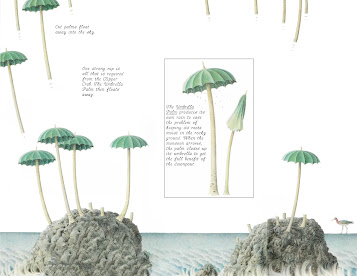Welcome to the April A to Z Blog Challenge! My theme this year is the Botany of the Realms of Imagination, in which I share a selection of the magical plants of folklore, fairy tale, and fantasy. You can find all my fellow A to Z bloggers on the Master List of participating blogs here, for your blog-reading pleasure.
U is for the upas or bausor, which is the most poisonous tree in the world. Funnily enough, the fruit is actually edible, but the sap is so deadly that to come anywhere within range of the tree is fatal. According to some accounts, nothing can live within a 15 mile radius from the upas. Some say that out of every ten condemned men sent to collect the sap, only one is likely to return alive, because most people can’t even reach the trunk before falling down dead. Another account says that a poisoned man can take no more than nine steps on level ground before dying. The use of this deadly sap was primarily to poison arrows and blow-darts in southeast Asia, and prisoners could also be executed by being tied at the base of the tree, always assuming, of course, that anyone could get within range of the tree long enough to tie them. (This is one of our magical plants that was born from exaggerated accounts of a real plant, Antiaris toxicaria, but the stories about it are so fantastical that I count the upas as a different, magical species.)
If we travel to South Africa we may be unlucky enough to encounter a similarly deadly tree. The umdhlebe is a shrub or small tree that not only has deadly sap, but can exhale poisonous vapors from the ground around its roots. What’s more, it can lure animals and people to it in order to kill them! The umdhlebe’s poison is used by witches, and anyone cultivating it is surely as evil as the tree itself. However, the fallen fruit of the tree, which looks like a long, black and red pod, can be an antidote to the poison. If you want to harvest the fruit, you must first sacrifice a goat or sheep to the demon of the tree, and only approach from the windward side. (Ditto the parentheses above about being based on a real species.)
For our third tree of the day we’re back to Neverbelieve Island. Umbrella Palms grow on rocky outcrops along the shore, where they must produce their own rain to keep their roots moist during dry spells. When seasonal rains come, Umbrella Palms close up their umbrellas so as not to block any of the water. Clipper crabs are known to cut through Umbrella Palm trunks with a nip of the claws, and a cut tree immediately floats away into the sky. I’m not sure why the crabs nip the umbrella trees, but presumably this is how the species can spread to new islands.
The moral of the upas and the umdhlebe is that when you encounter a being that toxic, it’s best just to stay as far away as possible - as much as 15 miles away! On the other hand, if you’ve discovered an antidote, please do share. Gardening tip of the day: consider keeping goats with your poisonous trees. But not if you actually like goats. (Remember the moral at M about not sacrificing animals…)
[Pictures: Upas Tree, hand colored wood block print from Hortus sanitatis, ca. 1497 (Image from University of Edinburgh);
Umdhlebe (not really), detail from Let’s Wait A While, print (etching?) by Themba Khumalo, 2019 (Image from Artist Proof Studio);
Umbrella Palms, illustration from The Land of Neverbelieve by Norman Messenger, 2012.]





I avoid killers of all kinds, trees included.
ReplyDeleteI only take an umbrella if it's raining or about to.
Killer tree -avoid at all cost ... how do we know that the berries are edible? I would not think it was an easy task to get to them.
ReplyDeleteUmrellas - I do not like umbrellas. They keep my upper half semi-dry, but soaks my pants and shoes. And if others are carrying them, trickles are sure to find their way down my neck. I avoid them much as poisonous trees.
Kristin, the secret to a long life is avoiding everything that will kill you!
ReplyDeleteCharlotte, I like having my own umbrella sometimes, but I agree that sharing an umbrella is always more hindrance than help.